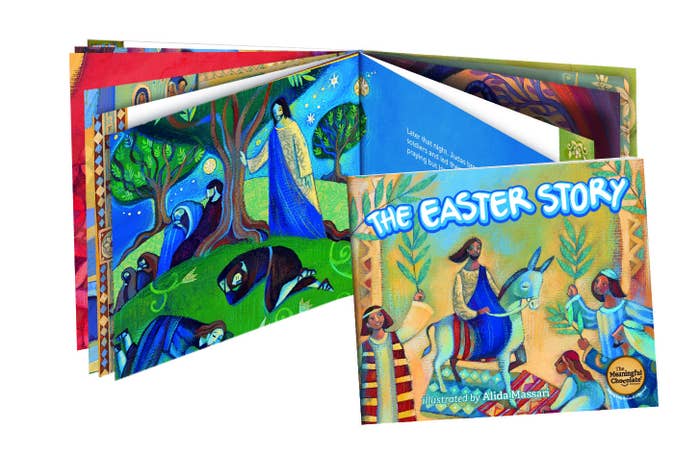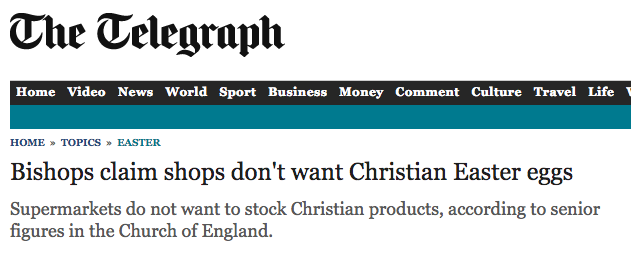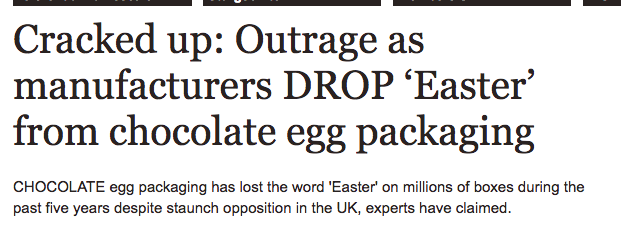
Coverage of Theresa May's trip to Saudi Arabia could have focused on her attempts to secure a post-Brexit trade boost, human rights concerns about the UK's arms sales to the country, or the importance of the intelligence-sharing arrangement between the two countries.
Instead, domestic headlines are being dominated by some strong comments the prime minister made to ITV News criticising the National Trust's apparent decision to exclude the word "Easter" from the title of its chocolate egg hunts, held in conjunction with chocolatier Cadbury.
The extent to which Cadbury really has relegated the Christian festival in its branding is disputed, especially since the word "Easter" appears liberally on other parts of the promotional material accompanying the Cadbury's Great British Egg Hunt event, which is being held at hundreds of National Trust properties.
To complicate matters, May appears to have fallen out with Helen Ghosh, the current chief executive of the National Trust, when Ghosh was the top civil servant at the Home Office.
What's more intriguing is how the annual dispute over the prominence of the word "Easter" on chocolate eggs came into being – and how much of it is the result of an annual campaign by a small Christian chocolate business based in Cheshire with close links to top levels of the Church of England hierarchy.
In the process, the prime minister may have ended up inadvertently wading into a marketing ploy for evangelical religious chocolate.
The Meaningful Chocolate Company began trading in 2010, when it it first produced the Real Easter Egg, billed as "the UK's first and only Fairtrade charity egg to explain the events of the Easter". The product combines a chocolate egg with a "24 page activity-story book".
In order to ensure children fully comprehend the reason they're gorging on chocolate, each Real Easter Egg features three crosses, while under the lid there is a quote from the Gospel of Mark describing Jesus's resurrection.
The not-for-profit business was founded by David Marshall, who served for several years as the Church of England's director of communications for the diocese of Manchester, giving him a direct line to key figures in the church.

At first the business focused on the religious aspect of the eggs, marketing them directly to Church of England schools and local churches, with press coverage focusing on how the religious chocolate had been developed after the company worked in "consultation with a number of churches and dioceses".
Sales were initially sluggish, and in 2012 the Daily Telegraph reported that the £3.99 egg had sold just 70,000 units. At first the company gained media coverage by highlighting supermarkets' apparent reluctance to stock the item, helped by quotes from friendly bishops who attacked the lack of religious Easter eggs.

The following year most major supermarkets agreed to stock the item, with the Bishop of Hereford telling the Daily Mail he had written to the likes of Tesco and Morrisons calling on them to sell the item in their stores. John Sentamu, the archbishop of York and the second most powerful man in the Church of England, personally lobbied for their sale.
According to one story, written by a journalist who is now head of media for the Church of England, he used one meeting with a supermarket boss to "repeatedly tell him to stock the eggs".
Marshall celebrated his young company's success and was quoted as saying that "our aim is to change the Easter egg market forever by making it more spiritual, more generous and more faithful".
Other products produced by the chocolate company include Advent calendars, which the company helped promote with a story about how Cadbury was allegedly stopping it using the ecclesiastical colour purple. But it really managed to break into the national media with a series of articles last year that, in conjunction with polling produced by YouGov, pushed the narrative that Britons were furious over the removal of "Easter" from chocolate products.

Marshall told BuzzFeed News that his business is a private company and "there’s no connection" between it and the Church of England.
In a statement issued by Sentamu on Tuesday, the archbishop once again promoted the product.
“To drop Easter from Cadbury’s Easter Egg Hunt in my book is tantamount to spitting on the grave of Cadbury," said Sentamu in his official comment on the matter.
The archbishop concluded: "Maybe everyone should now buy The Real Easter Egg."
